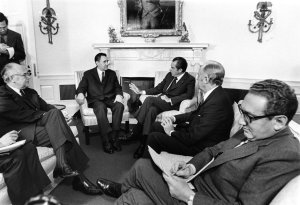Senator Mike Mansfield: "We did our best. We passed good legislation. We lost some legislation, because we didn't get the support from the White House that we should have."
Senator Hugh Scott: "Any President tries to get his program through, and this Congress being of a party different from the President gives him some of it and doesn't give him some of the very big and important things he'd like."
Announcer: Senate leaders Mansfield and Scott, accessing the 92nd Congress.
When the 92nd convened in January of 1971, President Nixon said he had three major legislative objectives: governmental reorganization, welfare reform and revenue-sharing. All three were still awaiting action when 1972 began, and only the third was passed, that in the closing hours of the session.
Though Congress had taken a long time to go to work on revenue-sharing, once it began the result was an almost forgone conclusion; and October 13th Ted Shields was able to report final legislative approval.
Ted Shields: "The Treasury already has prepared checks for state, city, town and county financial managers. The lower levels of Government will get more than $5 billion in the first year and more than 30 billion in the next 5 with no strings attached. The Administration hoped they will use at least part of the money to reduce property taxes. Ted Shields, Capital Hill."
Announcer: President Nixon elected to sign the bill at Independence Hall in Philadelphia. State and local government officials were on hand to praise it. Los Angeles County Board of Supervisors Chairman Warren Dorn was happy to go along with Washington's hopes for the $139 million it's sending his county in the first year.
Chairman Warren Dorn: "We're gonna use it to reduce our property taxes."
Announcer: San Francisco Mayor Joseph Alioto was looking forward to $27 million in revenue-sharing money in the first year.
Mayor Joseph Alioto: "That will effectively enable us to meet those programs which up to now because of very tough budgeting we've had to trench."
Announcer: Saint Louis County is in line for $20 million over the 5-year period. County Supervisor Laurence Russ expects to add police manpower, build roads and improve parks.
Supervisor Laurence Russ: "That will just give us the opportunity to fill in where our basic sources of revenue have been insufficient in the past."
Announcer: Newark, New Jersey's Mayor Kenneth Gibson says the money will go into the general fund.
Mayor Kenneth Gibson: " To offset the projected property-tax increase."
Announcer: Property taxes in Newark and elsewhere are a major source of money for the local share of the welfare bill. Welfare reform cleared the House in 1972, but the Senate okayed only limited tests of three competing plans. Senator Russell Long backed a work-fair plan considerably tougher than Mr. Nixon requested.
Senator Russell Long: "We're satisfied that the so-called reform thing did nothing to correct the basic things that are wrong with the welfare system."
Announcer: Another Democrat, Senator Abraham Ribicoff, offered a plan similar to, but slightly more generous than the President's guaranteed-annual-income proposal. It, too, failed, and Ribicoff accused Mr. Nixon of backing away from welfare reform when the matter finally came to a vote.
Senator Abraham Ribicoff: "President Nixon proposed a great idea and then walked away from it."
Announcer: The Executive Reorganization Plan had everyone walking away; it never even got serious Committee action.
Other Capital Hill decisions: the draft extended until July 1973 with the understanding that it would not be further renewed. One tough anti-busing bill passed, another even more stringent measure was killed in the closing hours of the session. Both Houses okayed the so-called Women's Rights Constitutional Amendment over the bitter opposition of South Carolina's Sam Ervin.
Senator Sam Ervin: "It would require Congress to draft nobody or to draft both men and women on exactly the same terms. It would destroy as loss concerning seduction. It would also be construed to require Congress to send women into combat with men."
Announcer: The Amendment is now before the States.
Congress okayed Social Security hikes and rejected the Administration demand for authority to cut particular appropriations. The White House said the Chief Executive would do so anyway. Some cuts were affected by a flurry of post-session vetoes, but there was no question of trimming some other spending: the funds earmarked for relief of victims of Hurricane Agnes and the Rapid City, South Dakota floods.











